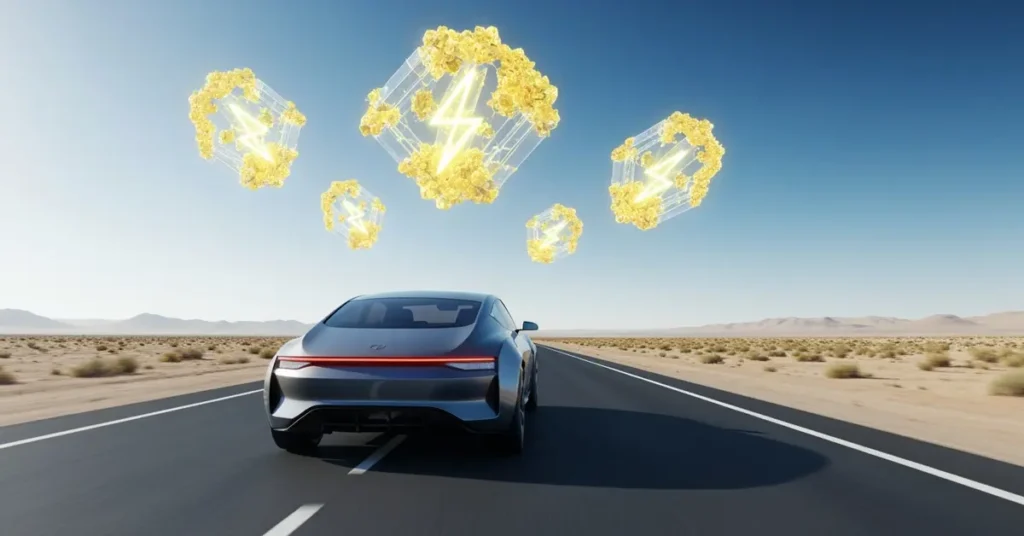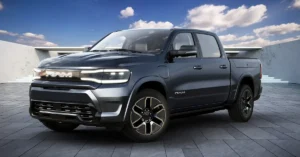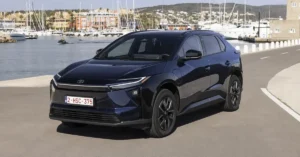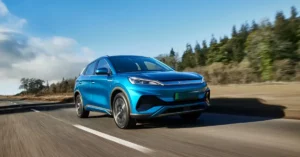Electric cars have come a long way in just over a decade. Once considered niche, they’re now mainstream, with global automakers racing to electrify their fleets. Today’s EVs can comfortably cover 400–500 km on a single charge, and some premium models stretch beyond 600 km. That’s impressive progress compared to the early days, yet one question lingers in the minds of many drivers: range anxiety.
For comparison, a petrol-powered sedan can often travel 700–1,000 km on a full tank, and refuelling takes just minutes. So while EV fans appreciate the quiet performance, low running costs, and environmental benefits, sceptics keep asking: “Will I run out of charge on the highway?”
Now imagine this: you start in Dubai, head west across the desert, and by the time you’ve crossed into Riyadh nearly 1,000 km later you’ve still got juice left in the battery. That’s the vision of Theion, a German startup betting big on a new technology called sulfur-crystal batteries. If successful, this chemistry could triple the range of today’s EVs, slash battery costs, and eliminate reliance on scarce minerals like cobalt and nickel.
Sounds like a dream? Let’s dig into why this might just be the real deal.
Why Sulphur-Crystal Batteries Matter
When people talk about EVs, batteries are at the heart of the conversation. Almost all electric cars today rely on lithium-ion batteries, which use a cocktail of materials including nickel, manganese, and cobalt (often abbreviated as NMC). These elements allow for decent energy density, meaning they can pack a lot of power into a relatively small space.
But there’s a catch.
- Cost and scarcity: Nickel and cobalt are expensive, and their supply chains are vulnerable to political and environmental challenges. Much of the world’s cobalt, for example, comes from mines in the Democratic Republic of Congo, where human rights concern often make headlines.
- Environmental footprint: Extracting and refining these minerals isn’t exactly clean. The carbon footprint of battery production remains a hot topic, even as EVs aim to cut emissions overall.
- Scaling problem: As global EV sales surge, demand for these rare materials is skyrocketing raising concerns about shortages and price spikes.
This is where sulphur steps in.
Sulphur is the 10th most abundant element on Earth. It’s cheap, widely available, and can often be sourced locally, reducing supply chain risks. Theion’s idea is simple but powerful: replace expensive NMC cathodes with sulphur while using lithium and carbon to complete the chemistry. The result? Cells that are lighter, denser, and cheaper to produce.
And the performance claims are eye-catching. Theion says its sulphur-crystal cells could reach 1,000 Wh/kg of energy density nearly three times the level of today’s best lithium-ion cells. That’s the difference between a 500 km EV and one that can comfortably push past 1,400 km.
For EV buyers, this means fewer charging stops, less weight in the car, and potentially lower costs. For the planet, it means moving away from environmentally damaging mining practices and toward a cleaner supply chain.
Learn more about lithium-sulfur chemistry from Nature Energy.
What Makes This Different From Current EV Batteries
So how does this actually stack up against today’s batteries? Let’s break it down in plain language.
1. Weight advantage
Think of your EV battery like a backpack. The more energy it carries, the heavier it gets. Current EVs squeeze around 250–350 Wh per kilogram. That’s why a long-range battery, like the one in a Tesla Model 3, can weigh over 600–800 kg.
With Theion’s sulphur technology, a 225 kWh battery (enough for roughly 1,400 km of range) could weigh as little as 225 kg. That’s lighter than many current packs that only store 75–100 kWh. The effect is huge: cars become lighter, more efficient, and better to drive.
2. Space savings
Weight isn’t the only concern space matters too. Current EVs often pack their batteries into a thick “skateboard” under the floor, raising ride height and limiting design flexibility. Sulphur batteries boast higher volumetric density, meaning they take up less physical space. That could allow automakers to design sleeker cars or free up more room for passengers and luggage.
3. Durability challenge
Here’s the tricky part: cycle life. A battery’s durability is measured by how many times it can charge and discharge before losing significant capacity. Current lithium-ion packs often last between 1,000 and 1,500 cycles, which translates into many years of driving.
Sulphur batteries have historically struggled here, often degrading too quickly. Theion says its first prototypes have hit 500 cycles at 500 Wh/kg, with a target of 1,000 cycles at full performance before mass production. If they succeed, sulfur batteries won’t just be powerful they’ll be practical for daily use.
EV battery performance data comparison.
Where We’ll See Sulphur-Crystal Batteries First
As exciting as the idea of a 1,000 km EV sounds, don’t expect sulphur batteries to show up in your local showroom tomorrow. Like all disruptive technologies, they’ll start small before scaling up.
Short-term focus: Theion is initially targeting industries where weight and density matter most think satellites, spacecraft, and drones. In these areas, shaving off a few kilograms can mean the difference between mission success and failure.
Medium-term applications: After aerospace, Theion plans to expand into urban air taxis, wearables, laptops, and smartphones. These devices demand compact, lightweight batteries but don’t require the same longevity as cars.
Long-term goal: The real prize, of course, is electric vehicles. But reaching the durability and cost benchmarks needed for mass-market EVs will take time. Once sulphur batteries hit the magic 1,000-cycle durability mark, they’ll be ready to take on today’s lithium-ion champions.
Aviation’s growing interest in lightweight batteries.
How This Could Transform Electric Cars
If sulphur-crystal batteries make it into cars, the industry could be turned upside down.
1. Range redefined
Today’s mid-size EVs average 400–600 km per charge. With sulphur, the same vehicle could cover 800–900 km without changing the battery size. Stretch that battery to 225 kWh, and you’re looking at 1,400 km enough to drive from Dubai to Kuwait City without a recharge.
2. Cost dynamics
Because sulphur is cheap and abundant, the overall battery cost could drop significantly. Today, batteries account for about a third of an EV’s price. Making them cheaper could help EVs reach price parity or even undercut petrol cars. Imagine walking into a dealership and finding the electric option not only greener but also cheaper upfront.
3. Charging perspective
A bigger battery means longer charging times. For instance, a 225 kWh pack would take many hours to fully recharge on a home charger and at least an hour on a high-speed public charger. But the flip side is fewer stops. If you can drive 900 km on a single charge, suddenly the inconvenience of charging fades into the background.
EV adoption and charging infrastructure outlook.
The Competition and Reality Check
Of course, Theion isn’t the only player chasing the sulphur dream. Startups like Lyten and Zeta Energy are also developing lithium-sulphur batteries, with big automakers like Stellantis already signing partnership deals. That’s a strong signal the industry sees promise here.
But scaling a battery from lab to factory is notoriously difficult. Just ask Tesla, which took years to refine its 4680 cell production. Challenges include ensuring consistent performance, extending cycle life, and keeping manufacturing costs low.
So while sulphur-crystal batteries may eventually redefine the EV landscape, they won’t do it overnight. Expect gradual progress over the next five to ten years, with breakthroughs showing up first in smaller markets like aerospace and consumer electronics before making their way into cars.
Read about Stellantis’ battery partnerships.
Conclusion: A Future Beyond Range Anxiety
If sulphur-crystal batteries deliver on their promises, they could finally put an end to range anxiety. Picture an EV that comfortably drives 900 km or more, recharges at home overnight, and costs less than a petrol car to buy and run. Add to that the sustainability benefits no nickel, no cobalt, lower carbon footprint and it’s easy to see why this technology excites industry watchers.
Of course, challenges remain. Cycle life needs to improve, manufacturing needs to scale, and automakers need time to redesign vehicles around these new chemistries. But the trajectory is clear: the next era of EVs will be lighter, cleaner, and longer-lasting.
For drivers, that means freedom. Freedom to plan a road trip from Dubai to Muscat or Abu Dhabi to Salalah without worrying about the next charging stop. Freedom from high running costs. Freedom from the compromises of the past decade of EV technology.
The future of mobility isn’t just electric it might be sulphur-powered.
Driving the EV Future in the UAE
In the UAE, where intercity drives often stretch 400–500 km, long-range EVs could be transformative. A Dubai resident could drive to Muscat in Oman, or even Jeddah in Saudi Arabia, without needing a recharge. For fleet operators and logistics companies, longer-lasting batteries mean fewer stops and more efficient operations.
The government is already investing heavily in charging infrastructure and pushing forward the Green Mobility Strategy 2030, which aims to increase EV adoption across the Emirates. As sulphur-crystal batteries mature, the UAE’s position as a hub for cutting-edge mobility could strengthen, aligning with its broader sustainability and innovation goals.
It’s no longer a question of if the EV revolution will reshape transport here it’s when. And with technologies like sulphur batteries on the horizon, that future may arrive sooner than we think.
Power Up Your EV with MotorHub
Owning an electric car is more than just charging and driving it needs the right care to keep performance at its best. At MotorHub, we provide complete EV services including battery diagnostics, high-voltage system checks, brake inspections, and cooling system maintenance. Whether you drive a daily commuter EV or manage a fleet, our certified experts ensure your car stays efficient, safe, and road-ready for every journey.



